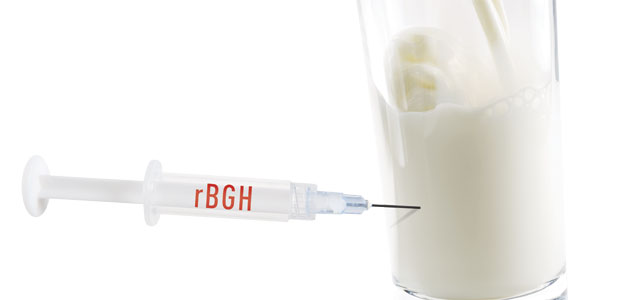Advertisement
What Doesn’t Do a Body Good?
In February 2007 Safeway stores throughout Oregon, southwest Washington, and parts of northern California stopped buying from dairy farmers who use rBGH. What are the implications when consumers disregard a country’s major food regulatory agency, in this case the Food and Drug Association (FDA)? Ignoring the FDA’s long-held stance that rBGH is safe to use … Continued

In February 2007 Safeway stores throughout Oregon, southwest Washington, and parts of northern California stopped buying from dairy farmers who use rBGH.
What are the implications when consumers disregard a country’s major food regulatory agency, in this case the Food and Drug Association (FDA)?
Ignoring the FDA’s long-held stance that rBGH is safe to use on dairy cattle might indicate that “buyer beware” has become “buyer distrust.” For companies such as Safeway, Starbucks, and Ben & Jerry’s Ice Cream, it also means that keeping business is about “buyer be heard.” Consumers 1, FDA 0.
Canadians can breathe a sigh of relief that Health Canada has, so far, banned the sale of the hormone. But the history of the drug’s development, use, and marketing worldwide reads akin to a Le Carre novel–a sort of pharmaceutical/dairy industry version of The Constant Gardener.
Bovine somatotropin (bST), or bovine growth hormone (BGH), occurs naturally in the pituitary gland of cattle and controls the amount of milk the animal produces. Recombinant bovine growth hormone (rBGH), a.k.a. recombinant bovine somatotropin (rBST), is the synthetic version. When injected into cattle it increases milk production by up to 12 percent. Such a small percentage of increase seems laughable when one adds up the amount of time, trouble, and money that Monsanto, the synthetic’s producer, has invested to market it–and tragic when one considers that North America produces a surplus of dairy.
In 1998 the Health Protection Branch of Health Canada published a “Gaps Analysis” of the research. It turns out that the title of the analysis was fitting, considering the research revealed more holes than…genetically modified Swiss cheese. The analysis concluded the following:
- Monsanto’s 90-day toxicology study on rats, which concluded that rBST could not be absorbed into the bloodstream, was “improperly reported.”
- Long-term toxicology studies to determine safety to humans were not conducted and the potential of rBGH to cause sterility, infertility, birth defects, cancer, and suppressed immune function were never addressed.
- No attention was given to the increase in rBST-related mastitis (infection of the udder) in dairy cows and the associated increased use of ongoing antibiotic therapy in cattle.
- The FDA’s review of Monsanto’s research prompted the investigation of several senior FDA officials who were later implicated by allegations of “employing unauthorized influence against subordinate staff and a personal conflict of interest.”
See: nfu.ca/gapsreport.html
Banned in almost every developed country on the planet, rBGH is still sold throughout the US, despite recent research linking it to cancer. rBGH has been found to increase insulin-like growth factor 1 (IGF-1) by up to 360 percent. IGF-1 is similar to insulin and plays an important role in the building of organs and tissues. Several studies have shown that increased amounts of IGF-1 appear to cause higher rates of prostate, breast, and colorectal cancer.
See: sciencemag.org/cgi/content/abstract/249/4971/875 and preventcancer.com/consumers/general/documents/hazard.pdf
While rBGH is still being used in most large farm dairies throughout the US under the name Posilac (monsantodairy.com), Monsanto stopped campaigning to sell it in Canada in the late ’90s–but not before the company was accused, in the scientific community and in the media, of trying to “buy” favourable research from scientists via grant money. A representative from Monsanto stated on Canadian national television that the scientists had “misunderstood Monsanto’s offer” for research money. Research support, Monsanto argues, does not equate bribery.
If you visit Health Canada’s site and read the “Report of the Royal College of Physicians and Surgeons of Canada on rBST,” scroll down to the Appendices; next to “Monsanto 90-day Study” is the note “Information not available.” Perhaps it’s not such a huge gap after all; apparently the information is not only “not available,” it’s also completely inaccurate. Then again, where information on food safety is concerned, a researcher’s “inaccurate” is a consumer’s “fabricated.” Tomato, tomahto…
See: hc-sc.gc.ca/dhp-mps/vet/issues-enjeux/rbst-stbr/rep_rcpsc-rap_crmcc_e.html
What About Bessie?
A 2003 study published by the Atlantic Veterinary College, University of Prince Edward Island, indicated some serious health issues associated with the use of rBGH in dairy cattle, including:
- a 25 percent increase in clinical mastitis (infection of the udder)
- an increased risk of cystic ovaries and twinning
- a 50 percent increase in the risk of clinical lameness associated with the use of rBST
- a reduction in the lifespan of dairy cattle
See: “A meta-analysis review of the effects of recombinant bovine somatotropin.” pubmedcentral.nih.gov/articlerender.fcgi?artid=280709




